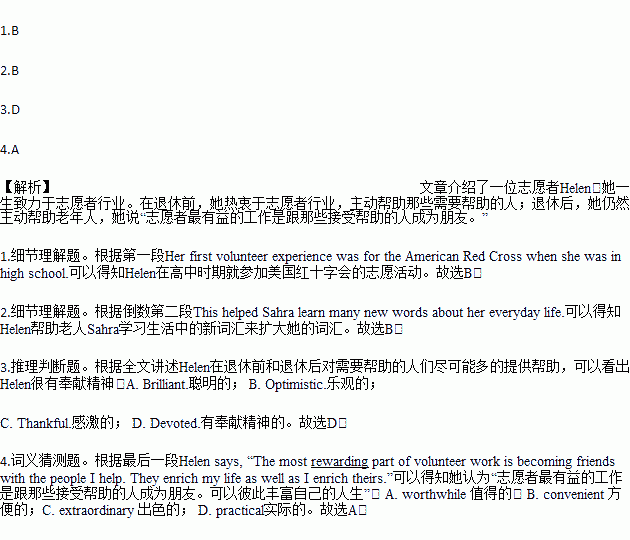题目内容
Helen Monson has always been interested in helping her community. Her first volunteer experience was for the American Red Cross when she was in high school. When she was a school teacher, she also found time to volunteer.
After she retired, she started volunteering to help the old. When her father was older, he was not able to see as well as he used to, which made her sad because he had always enjoyed reading.
She decided it would be fun to read to elderly people in her community. She also helped one woman write her stories. Ann was almost 100 years old, and Helen wrote down information about her life when she visited Ann. She put the information in a book and got it published. Ann was very excited to share her life story with her children and grandchildren.
One day Helen read an article in the newspaper about refugees (难民) who needed to learn English. Now, she meets once a week with Sahra, a 38-year-old woman from Somalia. Sahra is learning reading and writing skills. Helen gave Sahra a camera and asked her to take pictures of her daily life. She developed the pictures, and then asked Sahra questions about them. In the end they wrote a book together and used the photos in the book. This helped Sahra learn many new words about her everyday life.
Helen says, “The most rewarding part of volunteer work is becoming friends with the people I help. They enrich my life as well as I enrich theirs.”
1.When did Helen first take up volunteering?
A. After retirement. B. In high school.
C. After work. D. In childhood.
2.In what way did Helen help Sahra?
A. By building her self-confidence. B. By expanding her vocabulary.
C. By giving her financial support. D. By finding her a new home.
3.Which of the following can best describe Helen according to the passage?
A. Brilliant. B. Optimistic.
C. Thankful. D. Devoted.
4.The underlined word “rewarding” in the last paragraph probably means .
A. worthwhile B. convenient
C. extraordinary D. practical

